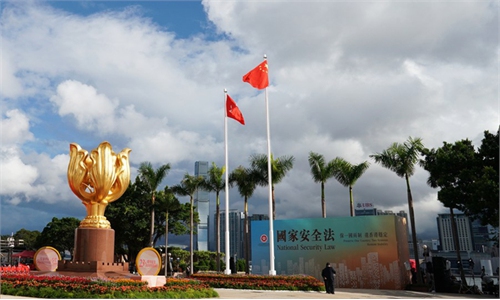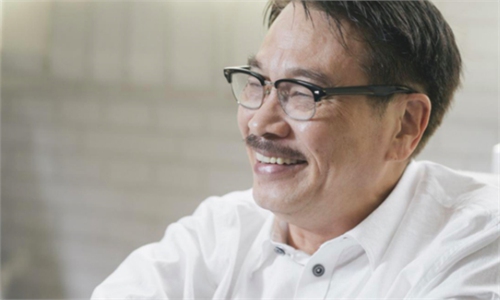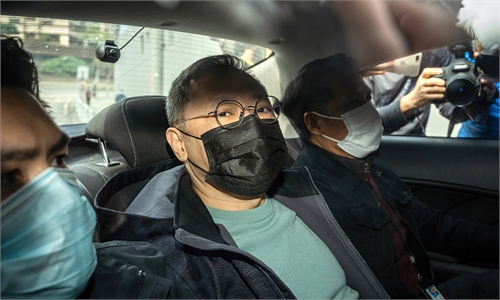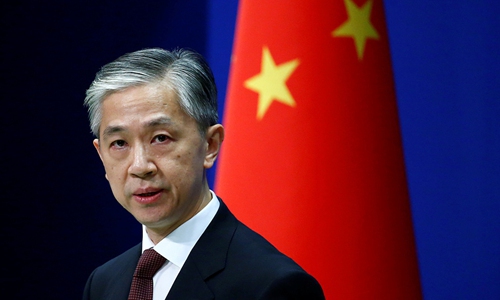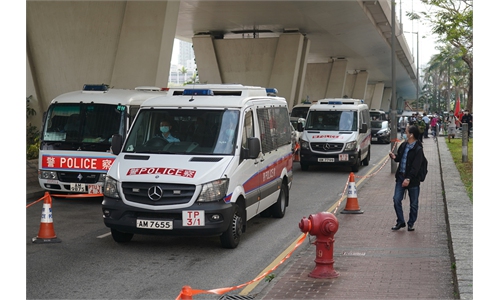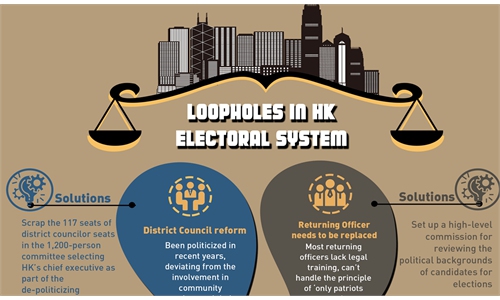Relationship between patriotism, loving Hong Kong and upholding the leadership of the CPC, fully explained
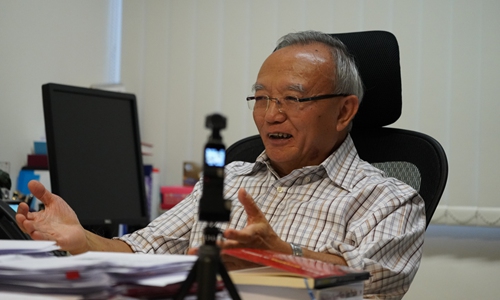
Lau Siu-kai, the vice-president of the Chinese Association of Hong Kong and Macao Studies, is interviewed by the Global Times.
Editor's Note:
The related departments of China's central government held a symposium from Sunday to Monday in the city of Shenzhen to hear opinions on improving systems related to "patriots governing Hong Kong."
Xia Baolong, vice chairman of the National Committee of the Chinese People's Political Consultative Conference and head of the Hong Kong and Macao Affairs Office of the State Council, attended the symposium, which heard the opinions of representatives from various sectors of Hong Kong society.
Reiterating the central government's unswerving determination to implement the "one country, two systems" principle, Xia said the comprehensive implementation of "patriots governing Hong Kong" is the key to achieving the steady and sustained development of "one country, two systems" principle.
On February 22, in a speech delivered at an online panel held by the Chinese Association of Hong Kong and Macao Studies, Xia sent a strong signal, saying that being patriotic is not an abstract theory and it means loving the People's Republic of China (PRC). The Communist Party of China (CPC) led the Chinese people to establish the PRC. In China, which practices socialist democracy, there is room for different political opinion, but there is a red line, that is to say, activity that undermines the fundamental system of the country, the socialist system under the leadership of the CPC, will never be allowed in China.
The speech sparked a lot of discussion in Hong Kong. Does "patriots governing Hong Kong" mean "those who love the CPC govern Hong Kong"? What are the differences and boundaries between "Hong Kong secessionists" and "ordinary residents with political opinion?" What does "firm patriots" mean?
To answer these questions, the Global Times (GT) conducted an exclusive interview with Lau Siu-kai (Lau), vice-president of the Chinese Association of Hong Kong and Macao Studies and former chief adviser of the HKSAR government's central policy unit. Lau fully explained the relationship between "patriotism," "loving Hong Kong" and "upholding the leadership of the CPC," and interpreted Xia's speech as sending a signal to three different groups in Hong Kong with certain different meanings.
GT: There were many voices in Hong Kong after Xia made the "patriots governing Hong Kong" remark on February 22. Some said it means "loving the CPC before loving the country". Some said it is not "patriots governing Hong Kong," it is "Party supporters governing Hong Kong." What's your opinion on those voices?
Lau: Those are deliberate misinterpretations of Xia's remarks. There was no such requirement to love the Party in Xia's speech. What he emphasized was respecting the constitutional order of Hong Kong since its return to the motherland, given the socialist system is the fundamental political system of China and the leadership of the CPC is the most essential characteristic of socialism with Chinese characteristics. No organization and no one is allowed to harm socialist system.
We can understand his remarks from a perspective similar to that of a "Negative List', which means you don't have to love the Party or believe in communism or socialism, but you can't take actions that try to change the fact that China is led by the CPC. You cannot go against the rules of the Constitution, or the Basic Law.
From another perspective, Xia's speech also corrects the long-standing misinterpretation of "patriotism" embedded in some Hong Kong residents' minds, which is to love an abstract "cultural China," "historical China," and "national China," and oppose the PRC in reality. Using such an excuse, those people engage in activities attempting to sabotage and overturn the PRC led by the CPC. Xia's speech aims to draw a clear "red line" for those people and their behavior.
GT: How do you think Hong Kong people should understand the relationship between "loving the country" "loving Hong Kong" and "upholding the leadership of the CPC"? What were the misunderstandings on these questions before?
Lau: For a long time, many people in Hong Kong did not have a correct understanding of the relationship between the three factors, as they see Hong Kong as an independent political entity and never seriously thought about Hong Kong people's responsibility and obligation to the country.
Some opposition forces in Hong Kong used this mentality and tried to pit Hong Kong's interests against the mainland's and the central government's interests. They claimed that there should be no "interference" from the central government in order to "protect" Hong Kong's interests, otherwise, it would bring no good to Hong Kong SAR. They also used these as slogans to incite people to engage in protests and made these a basis for them to push for "political democracy."
These thoughts had a market in Hong Kong and many people in the city still hold a hostile attitude toward the central government and the CPC.
But they neglect one fact - the "one country, two systems" principle is based on the common interests of the country and Hong Kong SAR. It benefits the country's development, maintaining of Hong Kong's systems and lifestyles, and the long-term prosperity of Hong Kong. The CPC is the creator of this principle. As Xia said that if someone claims to uphold the "one country, two systems", but opposes the creator and leader of this principle, isn't it self-contradictory? So "love the country" "love Hong Kong" and uphold the CPC" are consistent in the direction and interest.
I can't deny that there could be contradictions in the interests of the mainland and that of Hong Kong, but overall, Hong Kong and the country is a community with shared destiny. When the West suppresses China, it also suppresses Hong Kong at the same time. No matter Hong Kong people admit it or not, Western countries regard Hong Kong as an inseparable part of China.
Some opposition forces exploited the fact that the People's Republic of China is founded by the CPC, twisting some laws and regulations related to safeguarding national sovereignty and security as CPC's efforts to maintain its leadership. They engaged in activities that are anti-China and harm the national security under the disguise of loving "cultural China," "historical China," and "national China."
For these people, what Xia said is very clear - the central government will definitely not tolerate these people to flag themselves as "patriotic" and they will have no political future. The leadership of the CPC is unshakable and the central government would spare no effort to safeguard China's sovereignty, national security and development interests. This is also a stern warning to the opposition forces.
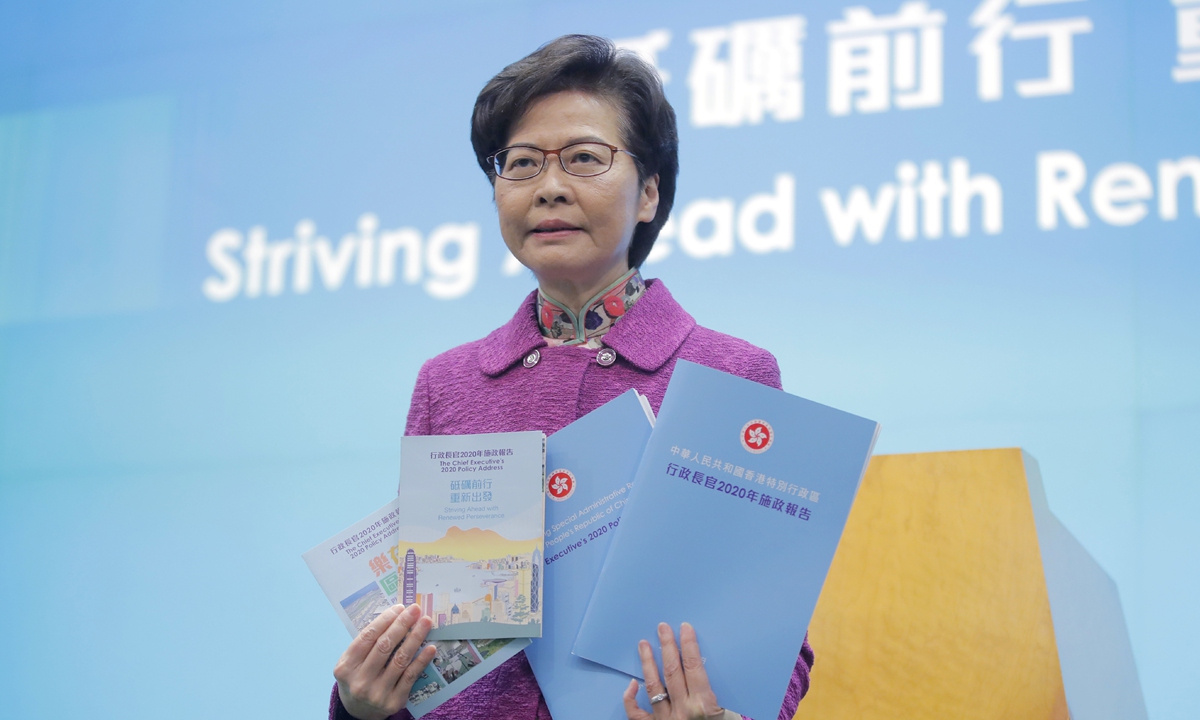
Hong Kong Chief Executive Carrie Lam poses with copies of her policy address at a news conference in Hong Kong on Wednesday. Lam lauded the city's new national security law on Wednesday as "remarkably effective in restoring stability." Photo: AP
GT: Xia also said that the principle of "only patriots governing Hong Kong" doesn't mean the central government won't allow different opinion. In Hong Kong, some residents still lack understanding, and even have bias and prejudice on the motherland and the mainland. The central government understands and tolerates such kind of attitude and also firmly believes that they will stay away from the anti-China troublemaking activists, and will actively participate in the governance of Hong Kong.
Lau: On this matter, what's the difference between the Hong Kong residents with bias and prejudice that could be tolerated, and the anti-China troublemaking activists? What signal the central government is trying to send to Hong Kong society?
When the central government drafted the "one country, two systems" principle in the last century, it admitted the fact that Hong Kong has quite a number of the people who have bias and prejudice toward the Communist Party of China (CPC), the People's Republic of China and socialism, therefore it has decided not to implement the mainland system in Hong Kong and respect the uniqueness of Hong Kong. The "one country, two systems" is made for this fact.
But allowing Hong Kong residents to have their own different opinions on the mainland doesn't mean they are allowed to take actions to overthrow the People's Republic of China and end the ruling status of the CPC, or change the socialist political system in the mainland. I believe Xia is sending messages to three groups of people: Firstly, to the radical opposition camp. The message is if they continue their way and cross the redline, they will face miserable consequences. Secondly, to ordinary residents. The message is the fundamental principle of the "one country, two systems" will remain unchanged. As long as no activity that endangers national security, normal criticism and scolding would be tolerated as expected, and in a better social political environment, the future development of democracy would also get better.
Thirdly, to those who want to enter the political system. The message is the central government has stricter demands on them, which is they have to be the firm patriots and they are not allowed to engage in activity that could harm the national security, and they should actively safeguard the national security and interests, and must be loyal to the central government and accept the leadership of the CPC.
GT: In the speech, Xia said that "patriots" include some "firm patriots," who should assume important positions, hold vital powers and shoulder the responsibility to govern the special administrative region. How do you understand the definition of "firm patriots"? What high requirements will the central government have for them than those for normal "patriots"?
Lau: In the future, the Hong Kong SAR will face growingly more complex, tougher and stronger political struggles. Under this circumstance, it is inevitable that the central government will have high requirements for "patriots," who could no longer only focus on Hong Kong's regional administrative management, but have to have international perspective, understand the international situation, have national consciousness and have awareness of the problems and challenges facing the country.
The most important is, the "firm patriots" who govern Hong Kong have to pay attention to opposite forces. These forces would not give up easily and certainly will seek chances to realize their objectives. "Firm patriots" have to possess strong fighting capacity and solidarity to deal with these struggles.
Specifically, "firm patriots" not only have to strictly implement the national security law for Hong Kong, but actively promote the establishment of systems and regulations related to safeguarding national security. And the reform is not only on administration, but involves various fields, including education, media and judicial system.
The national security law for Hong Kong is just a beginning. There is abundant specific work for "firm patriots" to continue, including the reform on Hong Kong's regional electoral system.
